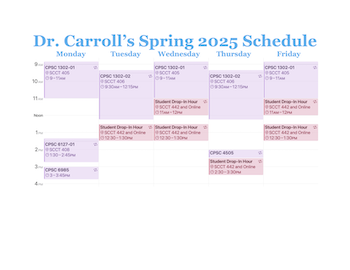Course Syllabus
Course Information
Course name and number: CPSC 1301K - Computer Science I
Credit Hours: 4
Course Description: This course includes an overview of computers and programming; problem solving and algorithm development; simple data types; arithmetic and logic operators; selection structures; repetition structures; text files; arrays (one-and-two-dimensional); procedural abstraction and software design; modular programming (including sub-programs or the equivalent).
This course is a required course for Computer Science, Information Technology, Management Information Systems, and Math.
This course counts in Core IMPACTS Area : Technology, Mathematics, and Sciences for other majors.
Required Competencies/Prerequisites: None
Course Offering (days/times and room): Online
Section: V01
Course Registration Number (CRN): 50388
Websites:
The last day to change schedules, including dropping without a grade and receive a 100% refund: Friday, May 24, 2024
Deadline to withdraw with a WP (Withdraw Pass): Friday, June 14, 2024
Instructor Information
Textbooks and Materials
Required Textbook
 How to Think Like a Computer Scientist: Interactive Edition
How to Think Like a Computer Scientist: Interactive Edition
Cost: $0
We will cover material in Chapters 1 - 13.
Provides an interactive environment that allows you to type in code and run them.
Also has useful features like interactive quizzes and tracing of code execution.
Resources
 Python Software Foundation website
Python Software Foundation website
Contains latest Python language documentation, tutorials, and guides
Modules
- Orientation
- Computational Thinking
- Python Introduction
- Debugging
- Modules
- Functions
- Selection
- Loops
- Strings
- Lists
- Files
- Dictionaries
Course Learning Outcomes
This course is a required course for Computer Science, Information Technology, Management Information Systems, and Math.
For all other majors, this is a Core IMPACTS course that is part of the STEM area.
Core IMPACTS refers to the core curriculum, which provides students with essential knowledge in foundational academic areas. This course will help master course content, and support students' broad academic and career goals.
This course should direct students toward a broad orienting question:
- How do I ask scientific questions or use data, mathematics, or technology to understand the universe?
Completion of this course should enable students to meet the following Learning Outcome:
- Students will use the scientific method and laboratory procedures or mathematical and computational methods to analyze data, solve problems, and explain natural phenomena.
Course content, activities and exercises in this course should help students develop the following Career-Ready Competencies:
- Inquiry and Analysis
- Problem-Solving
- Teamwork
By the end of this course you should be able to:
- Demonstrate an understanding of fundamental concepts of computer programming, including problem solving and algorithm development, procedural abstraction and software design
- Use simple data types, control structures, array and string data structures
- Demonstrate an understanding of these basic skills in programming by writing several significant programs
- Use good software engineering principles and developing fundamental programming
- Use the scientific method and laboratory procedures or mathematical and computational methods to analyze data, solve problems, and explain natural phenomena.
You can check the Course Map on the Course Introduction page.
Activity Expectations and Assignment Requirements
Practice Assignments
You have the opportunity to complete several practice assignments this semester to help you learn and retain the techniques that you will learn. For the practice assignments hosted on codePost.io, you can submit them late for reduced points (half off each week that it's late).
Projects
There will be three to four projects. Projects must be written in Python. It is recommended that you regularly keep a copy of your projects on a second device.
If an assignment contains portions that are more than 75% similar to other material (not provided by the instructor), zero points will be awarded. Additionally, an Academic Misconduct incident may be reported as well.
Students missing two or more projects will receive an F or FA in this course. It is recommended that you regularly keep a copy of your projects on a second device.
Project Late Policy
A total of at most 3 project late days will be granted for the entire semester for projects (and only for projects). For example, if Project 2 is turned in two days late and Project 3 is turned in one day late, then all of the late days for the semester have been used.
Exams
There will be three exams during the regular semester. They will be proctored using Respondus LockDown Browser and Respondus Monitor. There is a $15 per semester fee for using Respondus Monitor. These tools are known to not work with the following devices:
- Chromebooks
- iPads/tablets
- Android devices
- Smartphones
Furthermore, Respondus Monitor requires a webcam to work. If you do not have a compatible laptop or desktop, you will need to find an alternative method to take each of the exams. Some options include:
- You can borrow a computer from the CSU library (or a friend)
- You can come to campus and use a computer in the Tutoring Lab, SCCT 450
- You can take a proctored exam at a library. Most libraries offer these services.
Policy about Artificial Intelligence (AI) Use
You are allowed to use advanced automated tools (artificial intelligence (AI) or machine learning tools such as ChatGPT or Dall-E) on projects (but not other assignments) if the following two conditions are met:
- You use it to do only the following tasks:
- Assist with brainstorming / planning
- Assist with learning
- Assist with debugging
- Your use is properly documented and credited.
An example of proper documentation using ChatGPT-4 would be a comment like the following:
Generated using OpenAI's Chat-GPT-4 (https://chat.openai.com/) on MONTH, DAY, YEAR using the following query: 'Text of your query.'
Material generated using other tools should follow a similar citation convention.
Grading
Your final grade will be based on completing the following learning activities:
Performance Evaluation
| Graded Learning Activities/Assessments |
Percentage |
| Quizzes & Activities |
10% |
| Practice Programming Assignments |
10% |
|
3-4 Programming Projects
|
15% |
| 6 Independent Programming Assignments |
20% |
| 3 Exams |
30% |
| We Solve It! Group Project + Recorded Presentation |
15% |
| Percentage Range |
Final Grade |
Final Grade Calculation
| 90-100% |
A |
| 80-89% |
B |
| 70-79% |
C |
| 60-69% |
D |
| 59% and below |
F |
Expectations
WHAT YOU CAN EXPECT FROM ME
- I care about the success of each student. When you have questions about the course material, questions about the subject more broadly, concerns to discuss, accommodations you need, or thoughts you want to share, please come to my student drop-in hours (listed above).
- I will provide feedback and post grades within two weeks of submission dates.
- I will respond to your e-mail within 48 hours.
WHAT IS EXPECTED FROM YOU
- You are expected to be fully prepared to participate in the scheduled activity for each class.
- You are expected to complete the assignments when due, or to request an extension in advance.
- You are expected to be respectful to both your peers and your instructor in all interactions.
- You are expected to regularly check your official CSU email account, and to communicate with me in a professional manner.
Course Communication
Civil Discourse
I am committed to creating a positive learning environment where diverse perspectives are recognized and valued as a source of strength. I request that all students work with me to create a classroom culture based on open communication, mutual respect, and inclusion. As a class we will approach all discussions with respect and civility. Disagreements and debates in academic discourse are expected and welcome, but personal attacks are never OK, and will not be tolerated. I strive to ensure an open and welcoming classroom for all students. If I ever miss the mark, please don’t hesitate to come and talk to me. We are all learning together.
Discussions
- Discussion boards probe for your understanding and should foster student-to-student engagement.
- A discussion is an opportunity to voice your thoughts and opinions, but remember to be respectful and open-minded to your classmates' varying opinions.
E-mail
- Use your official CSU account for all e-mail communication.
- Follow common sense in writing and sending e-mail. As this course is a semi-public space, be cautious about sharing personal information such as your address or phone number.
- Read and think about e-mail before sending. Email is a permanent record of your communication.
- As a rule with all e-mail communication, always identify yourself and the course title.
Response Times
I will do my best to respond to your questions within 48 hours. Please identify in which course you are enrolled. Response times on weekends may vary.
Online Course Policies
Course Attendance Policy
Attendance is required by the university and is the responsibility of the student.
Additionally, it is the student's responsibility to independently cover any materials missed.
Makeup exams or quizzes are generally not given, so please make sure you are present for all exams and quizzes.
Attendance will be calculated for each module based on completing at least 70% of the graded activities for that module.
Attendance may also be used in determining grades.
It is your responsibility to make sure your attendance gets recorded correctly for every class meeting (see under Student Responsibilities below).
For this course, excessive absences (the point at which you can be dropped from the course and assigned a WF (Withdrawal Failing) is defined as missing the equivalent of six or more days of assignments.
Refer to the CSU Catalog (https://catalog.ColumbusState.edu/academic-regulations/undergraduate-academic-regulations/) for more information on class attendance and withdrawal.
Time Commitment
Taking an online course is not easier or faster. On the contrary, it will take as much time as taking an in-person class or more. If you normally go to class 3 hours per week per course, you will need to devote that same amount of time to your online course. In addition to online time, you should spend time studying and working with course materials several hours per week. It will be helpful to set aside regular study time in a place where you can work uninterrupted. Offline time could be spent composing messages to post online, reading, studying, and working on homework problems.
The amount of time it will take you to complete the work for the course will depend on many factors, which will vary with each individual. Students can expect to spend anywhere from 8 - 15 hours per week on this course. Consult with the course Calendar and your instructor to be sure you are on schedule, keeping up with the material, and submitting assignments and assessments on time.
As a general rule, in this course you will be expected to:
- Log in regularly to check messages from your instructor and other students.
- Check the Calendar for announcements from your instructor.
- Study, read online materials, and work on all assigned problems for each lesson.
- Complete all coursework and assignments in the time allowed.
Technical Requirements/ Support
See the CougarVIEW Starter Guide for support with navigating this system.
Hardware Requirements
See the System Checker here. (GeorgiaVIEW’s system checker is compatible with CougarVIEW.)
Software Requirements
- An office suite such as Microsoft Office or Open Office
- Microsoft Office 365 is available free to all CSU students through MyCSU.
- OpenOffice can be downloaded for free.
- Acrobat Reader offers additional features for PDF files.
Browser Plugins (.pdf files, QuickTime files, .mp4 files) can be obtained at a browser's website:


